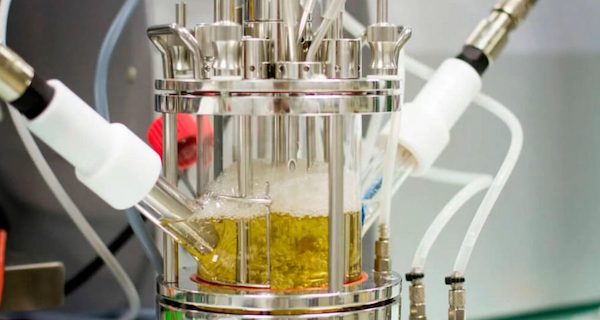
This Mutant Bacterial Enzyme Could Recycle Plastic Bottles In Just Hours
It’s one of the biggest challenges facing humanity: how to stop the tide of plastic pollution that is suffocating our planet. Now, a French company called Carbios has developed a mutant enzyme formula which can break down plastic into a pristine recyclable form in only a few hours.
Convenient, lightweight and offering greater profit than other products, the manufacture of plastic has greatly accelerated since the end of the Second World War.
Now more than 70 years later, plastic pollution has reached a scale of frightening global proportions and is a massive threat to people, animals and the environment. We need it, but we’re effectively drowning in it.
Before we go on to discuss Carbios’ possible solution to this massive dilemma, here are some facts (via National Geographic and Wikipedia) to remind you just how serious the problem is:
– 50% of all plastic ever made has been produced in the last 15 years.– Between 1950 and 2018, an estimated 6.3 billion tons of plastic was produced.
– Of those 6.3 billion tons, an estimated 9% has been recycled and another 12% has been incinerated. That leaves 79% unaccounted for.
– Plastic production is estimated to double by 2050.
– Annually, 8 million tons of plastic waste enters the oceans.
– Daily, around 8 million pieces of plastic ends up in oceans.
– Due to the additives used to make plastic more durable, it can take up to 400 years to break down.
– As many as 5.25 trillion macro and micro-plastic pieces are estimated to be floating in the ocean.
– Studies have found that 90% of seabirds contain plastic.
– There are giant plastic ‘islands’ floating in the ocean, one is recorded as being twice the size of Texas.
Using nature to fight plastic pollution
In short, we’re suffocating ourselves with plastic pollution and a long-term solution is desperately needed.
Which is why Carbios’ claims of being able to break down plastic pollution in hours could be such a game-changer.
The company’s idea is to use an enzyme that is found within composted leaves to break down plastic.
Already they are working with global companies Pepsi and L’Oréal to try and roll out their idea on an mass scale within the next five years.
“We are the first company to bring this technology on the market,” Carbios deputy chief executive Martin Stephan told The Guardian. “Our goal is to be up and running by 2024–2025, at large industrial scale.”
Overcoming the challenges
Plastic is comprised of a multiple of different layers, each which requires different equipment or temperatures to break down.
Poly (ethylene terephthalate) (PET), which used to make soda bottles, packaging and textiles, is one of the most common plastic pollutants.
But up until now, PET recycling has been inefficient. This is because when plastics of different colors are melted during recycling, a gray or black material is created, and not many companies want to use that as their starting material to create plastic products.
The basic idea for using leaf-branch compost as a means to break down plastic first came about in 2012, through researchers at Osaka University.
In order to maximise the potential behind this idea, the Carbios research team set about testing 100,000 micro-organisms, and then introducing mutations to the mix. They were able to isolate an optimized enzyme that is 10 000 times better at breaking down PET’s chemical bonds.
They claim that the new enzyme they’ve created can achieve at least 90% de-polymerization in as little as 10 hours.
And the different colors no longer matter as the enzyme is able to ignore dyes and other plastics during meltdown.
And the end result is a pristine product – a biologically de-polymerized plastic, which can reused to create items such as plastic bottles.
“It’s a real breakthrough in the recycling and manufacturing of PET,” said Dr. Saleh Jabarin, a member of Carbios’ scientific committee.“Thanks to the innovative technology developed by Carbios, the PET industry will become truly circular. Which is the goal for all players in this industry, especially brand-owners, PET producers and our civilization as a whole.”
The cost factor
Carbios claims that the enzyme will cost only 4% of virgin plastic made from oil.
The problem is that the enzyme can only be added to waste plastic which has already been melted. So for now, it costs a little more to manufacture than virgin plastic.
But because the enzyme-recycled plastic will be as strong and as attractive as virgin plastic, it’s hoped that companies will be willing to pay a bit more.
And once there is more buy-in from the big plastic producers, the recycling infrastructure should become less expensive. It’s crucial for the planet’s future that it does become a reality as quickly as possible.
Author: Anthony McLennan
Date: April 15th, 2020
Bio: I’m an experienced journalist who has written for some of South Africa’s biggest publications. Also a photographer, soccer coach, dog-lover and surfer, I enjoy spending time outdoors in beautiful Cape Town. I believe that a new approach is needed to sustain our planet and that it is important to put this message out.
View from Original Post
Category Posts
“A word fitly spoken is like apples of gold in pictures of silver.”
Proverbs 25:11
Psalm 135:14
